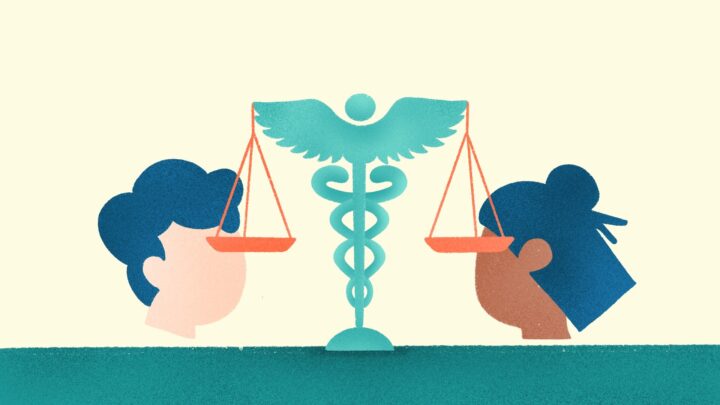
Following the overturn of Roe v. Wade, abortion is now illegal or heavily restricted in at least 11 U.S. states; and 12 additional states are preparing to quickly ban or severely restrict access to abortion.
Most abortion bans that have recently gone into effect or that will become law soon do make exceptions for life-threatening situations that arise in pregnancy.
However, according to NBC News, “there’s no clear legal definition of which conditions qualify for those exceptions, or how severe they have to be for a doctor to perform an abortion free of liability.
‘What does the risk of death have to be, and how imminent must it be?’ Lisa Harris, a professor of reproductive health at the University of Michigan, wrote in The New England Journal of Medicine earlier this month. ‘Might abortion be permissible in a patient with pulmonary hypertension, for whom we cite a 30-to-50% chance of dying with ongoing pregnancy? Or must it be 100%?’
Harris told NBC News that doctors in states where abortion is now illegal (which is not the case in Michigan) will likely ‘wait to that very last minute when it’s clear that a patient will die to do the procedure, and that’s just not an ideal time to do any kind of intervention.’
Experts expect more maternal deaths as a result.
Already, about 700 women die every year of pregnancy-related complications in the U.S., according to the Centers for Disease Control and Prevention. About 3 in 5 of those deaths are preventable. A study last year found that states that restrict abortion access have higher rates of maternal mortality than those that don’t…
Most abortion bans make it a felony to provide or attempt to provide an abortion, meaning doctors and clinics are the ones likely to be charged and tried, rather than individual patients.”
A recent poll of 460+ Sermo physicians confirms the fear and uncertainty that doctors face in the aftermath of the overturning of Roe v. Wade:
- 74% of physicians said they are unclear on what constitutes a life-threatening emergency that would allow a doctor to legally perform an abortion in states where it is otherwise banned.
- 84% worry that doctors are being asked to wait until the very last minute when it’s clear that a patient will die, before they perform an abortion.
- 84% are concerned that most abortion bans make it a felony to provide or attempt to provide an abortion—meaning doctors and clinics are the ones likely to be charged and tried, rather than individual patients.
- 87% believe some doctors will err on the side of their own legal safety when making decisions about patient care and the necessity of abortion.
- 74% expect more maternal deaths will result in states where abortion is banned.
When segmenting the results to U.S. physician respondents only, the findings show:
- The majority of U.S.-based physicians are unclear about what constitutes a life-threatening emergency that would allow a physician to legally perform an abortion in a state where abortion is otherwise banned; as reported by 70% of U.S. physicians surveyed.
- The majority of physicians feel state abortion bans will potentially have life-threatening consequences for mothers. 68% of U.S. physicians surveyed expect more maternal deaths in states where abortion is banned.
- U.S.-based physicians are highly concerned about the legal implications of performing an abortion in a state where it is banned. 76% of U.S. physicians surveyed are concerned that it is a felony for doctors and clinics to provide or attempt an abortion.
- State guidelines of having to wait for a medical issue to seriously escalate before performing an abortion has physicians worried. 79% of U.S. physicians surveyed are highly concerned that doctors are being asked to wait until the very last minute when it’s clear a patient will die before performing an abortion.
- Legal implications have changed physicians’ decision-making process when considering performing an abortion. 89% of U.S. physicians surveyed feel doctors will now make decisions based on their own legal safety when deciding the necessity of an abortion.
(n= 243 U.S.-based physicians)
Below, Sermo physicians from around the world share more of their professional insights, perspectives, and opinions on this important topic—in their own words:
“Physician care is questioned in medical malpractice cases and are subject to non-medical juries who decide on a “preponderance” of the evidence – basically does the evidence lean for or against the medical professional. Cases are frequently settled if the physician and insurance company feel it is too risky to take a very sympathetic case to trial even when the medicine is defensible. I would guess this is what would happen in Texas since enforcement is based on civil suits. The provider should be certain their medical malpractice carrier will cover these cases. I would expect a guilty verdict in criminal cases to be more difficult since juries are required to use the “beyond a reasonable doubt” legal burden to find the abortion provider criminally guilty. In civil and criminal cases, both sides will have medical experts to address whether the abortion was medically necessary under the law.”
Internal Medicine, U.S.
“If I were a physician who might be in a position of performing an abortion to save a mother’s life, my worry would be whether my decision could be called into question after the fact, and a judge or jury made up of people with no medical knowledge could decide that I had performed an illegal abortion because the mother’s health was not sufficiently in danger.”
Physical Medicine & Rehabilitation, U.S.
“Clear rules must be established where it is decided to interrupt the pregnancy, it is a very delicate legal, religious and moral issue.”
Pediatrics, Venezuela
“Criminal abortion has existed in every period of history and in every society. If legal ways are closed, illegal ways and methods get involved. Septic abortions and maternal deaths caused by illegal methods were problems we faced every day.”
OBGYN, Turkey
“What happened to privacy….since when does the government have any say in the doctor-patient relationship?”
OBGYN, U.S.
“In my opinion, there are pathologies that are completely incompatible with pregnancy, such as II, III, and IV degree heart failure, and others that put a woman’s life at risk.
society, I think there should be specific causes as in the case of fetal malformations that do not offer any quality of life to the product of conception, a healthy fetus is not the same (and even so there is a risk) to one that pathologies that are not compatible with life are diagnosed.
Other cases could be rape, incest and causes that may affect the physical and mental health of a woman.”
OBGYN, El Salvador
“Very controversial topic …..especially there could have issues with IVF and even ectopic pregnancies (though in no way salvageable). Rarely is there a case when the woman’s health is truly in imminent risk of death from a pregnancy, but it does happen. The biggest issue is that the mental health aspect is no longer likely to meet the criteria of many – which will save babies, but cause great arguments. The greatest push back predictably will be in cases of (especially underage) rape and incest victims.”
Family Medicine, U.S.
“Absolute prohibitions bring about a rebound effect and care must be taken with this, since a woman who cannot assume a pregnancy, or who does not want a child, can resort to empirical, illegal, unsafe methods, with inadequate asepsis in order to not terminate the pregnancy. It will generally increase morbidity and mortality, including depression in women of childbearing age. There could also be more cases of mortality in neonates.
It should be remembered that the Dry Law in the United States, between 1920 and 1933, ‘was worse the remedy than the disease’…”
General Practice, Cuba
“in the states where abortion is illegal then maternal deaths will definitely rise. It’s hard to tell which pregnancy will be life and if wait too long the mother may die. Illegal abortions will increase as deaths from illegal abortions.”
Internal Medicine, U.S
“I am of the opinion that abortion should not be completely prohibited, there should be specific indications such as rape, malformations incompatible with life, in minor women, among other well-justified indications.”
Oral & Maxillofacial Surgery, El Salvador
“Abortion is healthcare. The only people who should be in the exam room are the physician and the patient.”
Ophthalmology, U.S.
“Probably best to leave these decisions up to parents and their healthcare provider. If there was a law limiting male autonomy over their bodies people would lose their minds.”
Pathology, U.S.
“In my opinion I do not agree with the practice of abortion, but you also have to understand that it is the family’s decision when they want to have a child.”
General Practice, Cuba
“This is not good. In fact, it is terrible. It looks like we are going back to the middle ages when witches were being burned at the stake. Also, it is not just the mother’s health but how to deal with severely deformed babies who won’t have any kind of a meaningful life. Such births will surely ruin the life of the mother and her entire family for the rest of their lives. In principle everybody is against abortion. This is true when everything else may be fine, mother’s health, etc. However, there should be a legal way left to deal with abortion if unusual circumstances develop, without making the mother a criminal in the process, along with her neighbor, friends, family members, Uber driver, etc. All this is really cruel, mean, and uncalled for, especially in the 21st century. My goodness! What do the “conservatives” want? Raise these children so that they can become human targets for crazy gun owners’ practice in our “killing fields” later, read, our schools?”
Rheumatology, U.S.
Everyday thousands of Sermo member physicians from diverse backgrounds and experiences exchange knowledge with each other. Sermo is the original medical social network that empowers today’s physicians. Over 1 million fully verified physicians across more than 150 countries come to our platform to talk with peers, participate in paid medical studies, solve challenging patient cases, contribute to the world’s largest database of drug ratings – and enjoy a few laughs along the way.
Interested in more? Check back any time and follow us on Facebook, Twitter, and LinkedIn for the latest and greatest in physician insights.
Are you a physician or healthcare practitioner?
Explore the many benefits of joining Sermo’s medical community and sign up for free today.














